|
|
|
Sort Order |
|
|
|
Items / Page
|
|
|
|
|
|
|
| Srl | Item |
| 1 |
ID:
146697
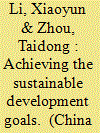

|
|
|
|
|
| Summary/Abstract |
Development became a G20 priority under the Korean presidency in 2010 and has remained central to global summitry ever since. Although the G20 has formally involved itself in the post-2015 process following the St. Petersburg Summit in 2013 and emphasized the Sustainable Development Goals (SDGs) as a core priority under Turkey's presidency in 2015, the UN remains the main channel for global negotiations and discussions of the post-2015 development agenda up to its approval and adoption in September 2015 and will continue to play the leading role in the follow-up implementation and tracking of SDGs. The present paper argues that as the SDGs come to dominate the agenda and action of donors and issues of financing take central stage, the G20 can play an important role in facilitating the implementation of the SDGs due to its various strengths, although it also faces serious challenges. The paper also points out that as the 2016 G20 chair, China can make great contributions in advancing the implementation of the SDGs both domestically and internationally.
|
|
|
|
|
|
|
|
|
|
|
|
|
|
|
|
| 2 |
ID:
146700
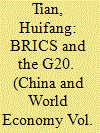

|
|
|
|
|
| Summary/Abstract |
Brazil, Russia, India, China and South Africa (BRICS) have come together economically as a group since 2009. Their cooperation has been driven not only by economic and political factors, but also the failure of the existing global economic governance framework to satisfy the real needs of these countries. In this paper, we analyze how the BRICS moved from a financial category into a political group, and are progressively developing from a dialogue-based platform into a full-fledged mechanism of long-term coordination on a wide range of key issues relating to the world economy and politics. We also analyze how the BRICS have coordinated their positions in the G20, pushing for deep reform in global governance. Then, given the major hindrances to cooperation among the BRICS, including the challenge of economic transition, weak geopolitical links, complicated internal and external relations and inadequate governance capabilities, the present paper speculates on how the BRICS can use the opportunity arising from China taking the G20 presidency in 2016 to improve the cohesiveness and influence of the BRICS in terms of their agenda, organization and deliverables.
|
|
|
|
|
|
|
|
|
|
|
|
|
|
|
|
| 3 |
ID:
146698
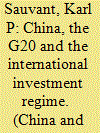

|
|
|
|
|
| Summary/Abstract |
China has become a major home country for outward foreign direct investment (OFDI) flows. As a result, the country is increasingly concerned with protecting its OFDI and facilitating the operations of its firms investing abroad and creating a strong universal international investment law and policy regime. This article briefly reviews the emergence of China as an outward investor. It continues with an analysis of some policy issues related to the rise of FDI from emerging markets. A brief discussion of issues central to the future of the international investment law and policy regime follows, before focusing on several outcomes that could be pursued under China's G20 leadership: nonbinding shared principles that could outline the architecture of a universal framework on international investment; an international support program for sustainable investment facilitation; and the creation of an additional intergovernmental platform that would allow for a continued systematic intergovernmental process to discuss the range of issues related to the governance of international investment, preferably paralleled by an informal, inclusive and result-oriented consensus-building process that takes place outside intergovernmental settings.
|
|
|
|
|
|
|
|
|
|
|
|
|
|
|
|
| 4 |
ID:
146692


|
|
|
| 5 |
ID:
146693


|
|
|
|
|
| Summary/Abstract |
Pivotal informal organizations, above all the G20, the G7 and the BRICS, have accumulated growing power in recent years. At a basic level, informal organizations differ from the formal institutions such as the UN and the IMF in a number of key ways: membership structure; foundational or legitimizational character and level of bureaucracy. What are the implications of this phenomenon for global governance? What does this shift from a hub club to a focal point network imply for innovation in modes of cooperation? The author has participated in numerous such summits, in his capacity as Prime Minister of Italy and President of the European Commission, and shares his first-hand thoughts.
|
|
|
|
|
|
|
|
|
|
|
|
|
|
|
|
| 6 |
ID:
146699
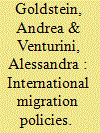

|
|
|
|
|
| Summary/Abstract |
International migration should be a core subject for global governance, given its transnational nature, and yet it is its “ugly duckling” and the global community has shied away from taking any concrete action to regulate cross-border flows of people, at least until 2015, when the refugee crisis in the Mediterranean prompted Turkey to include migration in the Antalya agenda. It is unlikely that the international community will move beyond the current consensus based on humanitarian principles and recognize that the free flow of people is a right, on the same level as trade and capital liberalization. At the same time, much of the criticism of migration policies is misplaced: efforts should be focused on improving the implementation of existing policies and fine-tune these policies in relation to entrance and integration, preferably in cooperation with the country of origin. The G20 should play a leading role in facilitating such coordination, also taking into account the increasing importance of South–South migration (such as the migration of Chinese citizens to Africa).
|
|
|
|
|
|
|
|
|
|
|
|
|
|
|
|
| 7 |
ID:
146695
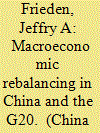

|
|
|
|
|
| Summary/Abstract |
The principal challenge facing the world economy is the risk of recurrent financial crises. Global macroeconomic imbalances create the conditions for boom-and-bust cycles that are extremely costly for the countries that experience them, and that can affect other nations and the entire world economy as well. The G20 recognizes the importance of these trends, and has committed itself to cooperative measures to reduce imbalances. However, progress has been limited and halting. There are major political obstacles to global macroeconomic policy cooperation, both within countries and among countries. China's attempts to rebalance its economy are crucial to broader international financial stability. Its G20 presidency gives China the opportunity to demonstrate that it is willing and able to advance its cooperation with economic partners, and to help lead the rest of the world in this direction.
|
|
|
|
|
|
|
|
|
|
|
|
|
|
|
|
| 8 |
ID:
146696
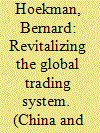

|
|
|
|
|
| Summary/Abstract |
Since 2008, G20 leaders have repeatedly committed themselves not to resort to protectionism and to conclude WTO negotiations expeditiously. The jury is out on the extent to which they have lived up to the first promise; they have failed to deliver the second. Anemic global trade growth rates since 2010 imply that trade has not been a driver of much-needed economic dynamism. This paper argues that the G20 should pursue a more ambitious trade agenda and that there is much that greater leadership by the G20 could do to reinvigorate the trading system. A first step would be to commit to concrete actions that can be implemented by individual governments on a concerted basis and that center on reducing trade costs and improving access to services for firms. The Chinese presidency should also seek to have the G20 commit to more effective monitoring and analysis of trade policy broadly defined (including subsidies and investment incentives) and the impact of the many preferential trade agreements involving China, the EU and the USA, the world's largest trading powers.
|
|
|
|
|
|
|
|
|
|
|
|
|
|
|
|
|
|
|
|
|